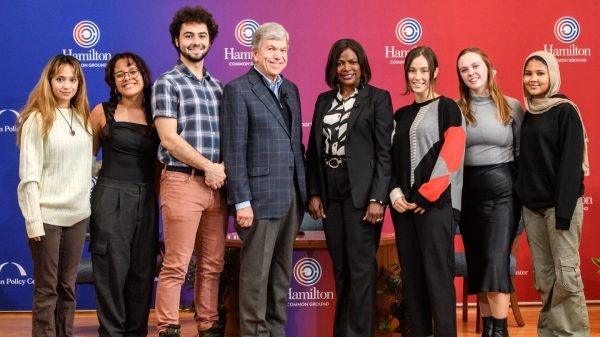
For the first time in Hamilton College history, students of all class levels and disciplines gathered in the Fillius Events Barn for a campus-wide debate. The well-attended event, held on Wednesday, Feb. 26, posed the topic: “Environmental Protections Are More Important than Economic Growth.”
The evening began with a few words from Robert Neithart ’26, a Common Ground ambassador and the co-chair of the debate. He spoke on the intentions of a “student-focused but also student-led” discussion. After his brief introduction, Neithart handed the microphone to the Director of Environmental Studies, Professor Aaron Strong. Strong underscored the importance of having a conversation based primarily on differences of values and ideology and avoiding a debate of “throw[ing] facts at each other.” Mae Rum, a program coordinator for the College Debates and Discourse Alliance and the chair for the night, explained to the audience the rules of the ensuing debate, which took the form of an amended parliamentary style. This debate style, with participants required to address the presenter as “the speaker” and rigid time guidelines, sought to generate a more productive and less combative discourse.
To kick off the discussion, four students alternated arguments on the affirmative and negative sides. After each three-minute speech, the floor was opened to the audience for questions. Once the original four speakers had provided their arguments, any attendee was permitted to present an address of their own.
On the economic side, most speakers emphasized the importance of having a stable and lucrative society before such environmental protections could be effectively implemented. They cited green energy subsidies and carbon sequestration projects as examples of programs that could, in the long term, play a deciding role in reversing the effects of climate change. Still, many said that this would not be possible without government subsidies, which are only possible due to stable economic growth. Multiple proponents also pointed out the difficulty in electing a president, representative or any other governing official who did not prioritize the voters’ pocketbooks.
Speakers favoring environmental protections based much of their argument on moral principles, referencing the adverse effects of climate disasters on working-class people globally and the continuous destruction of property and life. They emphasized that economic growth does not always run counter to the safety of the environment.
These presenters also criticized those of the negation for their lack of urgency in confronting many environmental threats, arguing that time was running out to develop the economy that some argued would be required for combating climate change.
Michael Stewart ’25 offered the following remark: “I think that those in support of the resolution [environmental protection stance] viewed the problem through a risk management lens, while those against it [economic growth stance] focused on pragmatism.”
After a sprawling conversation, Rum closed the floor and shifted to focus on people’s opinions concerning the debate format, namely what they liked and disliked. Students generally expressed gratitude to the college, Rum and other event coordinators for their dedication and innovation. Others proposed possible areas for improvement, including the addition of televisions and scrap paper for attendees. Generally, however, the audience viewed the format positively, emphasizing particular highlights like the constant civility and rigid debate format.
Mae Rum, who served as “Madame Chair” for the evening, is a program coordinator for the College Debates and Discourse Alliance. This unique event series is run by a coalition between the American Council of Trustees and Alumni (ACTA), Braver Angels and BridgeUSA. Rum said of the debate format, “It helps people communicate with one another… and not feel like I need to change your mind, you need to change my mind.” Specifically, in detailing the amended parliamentary style, Rum contends, “instead of cutting each other down, hurling facts at each other… what we’re going to do is deeply listen… and come from a place of good faith.”
This debate was part of the Common Ground series, which organizes events to explore diverse topics from national and global perspectives. The series aims to foster critical thinking and meaningful dialogue on essential issues. Thanks in part to the success of Wednesday’s event, plans for another campus-wide debate are in the works for this coming fall. The next Common Ground event, on affirmative action, will be held April 15 in the Chapel.